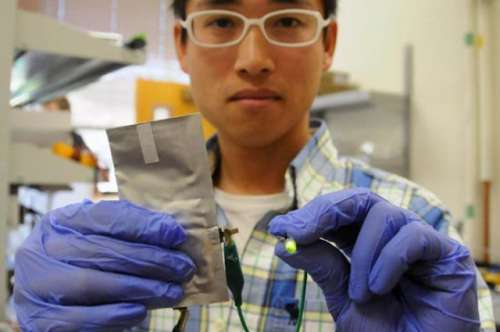 Owners of modern smartphones often experience frustration when their phone battery quickly “dies” and they have to wait several hours for it to fully charge. Soon, such situations may become a thing of the past, as scientists have recently presented a battery that can charge gadgets in one minute.
An aluminum battery developed by Stanford University researchers is an alternative to the current lithium-ion batteries that are currently used in smartphones. Scientists claim that the new battery will also not harm the environment and will be protected from fire.
“We have developed an aluminum battery that can replace environmentally harmful lead-acid batteries and flammable lithium-ion batteries,” said Dai Hongji, a professor of chemical sciences at Stanford University. “Our new battery will not catch fire even if you drill it.”
The key features of the amazing battery are that it can be bent, which will allow it to be used in flexible devices. In addition, the production of such batteries will be more profitable in financial terms, because aluminum is cheaper than lithium.
According to scientists, the aluminum battery has been the subject of many years of research, but the key task was to find materials that can provide enough energy after repeated charge and discharge cycles.
The battery of Stanford scientists can withstand more than 7.5 thousand charge cycles without losing power, compared to previous aluminum batteries, which "died" after 100 charge and discharge cycles. A typical cycle of a lithium-ion battery lasts about a thousand cycles.
Dai Hongji also said that aluminum batteries can be used to store renewable energy from the electric grid.
"The world needs a battery with a long life cycle that can quickly accumulate and release energy," he explained. "Our latest research shows that an aluminum battery can be charged tens of thousands of times. It is difficult to imagine building a huge lithium-ion battery to store large amounts of energy." But the researchers acknowledged that they still have a lot of work to do before the battery can power consumer products. Dai noted that the aluminum battery prototype so far can support 2V, rather than the 3.6V of a lithium-ion battery, and only 40W/kg of power, compared to 100-200W/kg for lithium-ion batteries.
Owners of modern smartphones often experience frustration when their phone battery quickly “dies” and they have to wait several hours for it to fully charge. Soon, such situations may become a thing of the past, as scientists have recently presented a battery that can charge gadgets in one minute.
An aluminum battery developed by Stanford University researchers is an alternative to the current lithium-ion batteries that are currently used in smartphones. Scientists claim that the new battery will also not harm the environment and will be protected from fire.
“We have developed an aluminum battery that can replace environmentally harmful lead-acid batteries and flammable lithium-ion batteries,” said Dai Hongji, a professor of chemical sciences at Stanford University. “Our new battery will not catch fire even if you drill it.”
The key features of the amazing battery are that it can be bent, which will allow it to be used in flexible devices. In addition, the production of such batteries will be more profitable in financial terms, because aluminum is cheaper than lithium.
According to scientists, the aluminum battery has been the subject of many years of research, but the key task was to find materials that can provide enough energy after repeated charge and discharge cycles.
The battery of Stanford scientists can withstand more than 7.5 thousand charge cycles without losing power, compared to previous aluminum batteries, which "died" after 100 charge and discharge cycles. A typical cycle of a lithium-ion battery lasts about a thousand cycles.
Dai Hongji also said that aluminum batteries can be used to store renewable energy from the electric grid.
"The world needs a battery with a long life cycle that can quickly accumulate and release energy," he explained. "Our latest research shows that an aluminum battery can be charged tens of thousands of times. It is difficult to imagine building a huge lithium-ion battery to store large amounts of energy." But the researchers acknowledged that they still have a lot of work to do before the battery can power consumer products. Dai noted that the aluminum battery prototype so far can support 2V, rather than the 3.6V of a lithium-ion battery, and only 40W/kg of power, compared to 100-200W/kg for lithium-ion batteries.
 Owners of modern smartphones often experience frustration when their phone battery quickly “dies” and they have to wait several hours for it to fully charge. Soon, such situations may become a thing of the past, as scientists have recently presented a battery that can charge gadgets in one minute.
An aluminum battery developed by Stanford University researchers is an alternative to the current lithium-ion batteries that are currently used in smartphones. Scientists claim that the new battery will also not harm the environment and will be protected from fire.
“We have developed an aluminum battery that can replace environmentally harmful lead-acid batteries and flammable lithium-ion batteries,” said Dai Hongji, a professor of chemical sciences at Stanford University. “Our new battery will not catch fire even if you drill it.”
The key features of the amazing battery are that it can be bent, which will allow it to be used in flexible devices. In addition, the production of such batteries will be more profitable in financial terms, because aluminum is cheaper than lithium.
According to scientists, the aluminum battery has been the subject of many years of research, but the key task was to find materials that can provide enough energy after repeated charge and discharge cycles.
The battery of Stanford scientists can withstand more than 7.5 thousand charge cycles without losing power, compared to previous aluminum batteries, which "died" after 100 charge and discharge cycles. A typical cycle of a lithium-ion battery lasts about a thousand cycles.
Dai Hongji also said that aluminum batteries can be used to store renewable energy from the electric grid.
"The world needs a battery with a long life cycle that can quickly accumulate and release energy," he explained. "Our latest research shows that an aluminum battery can be charged tens of thousands of times. It is difficult to imagine building a huge lithium-ion battery to store large amounts of energy." But the researchers acknowledged that they still have a lot of work to do before the battery can power consumer products. Dai noted that the aluminum battery prototype so far can support 2V, rather than the 3.6V of a lithium-ion battery, and only 40W/kg of power, compared to 100-200W/kg for lithium-ion batteries.
Owners of modern smartphones often experience frustration when their phone battery quickly “dies” and they have to wait several hours for it to fully charge. Soon, such situations may become a thing of the past, as scientists have recently presented a battery that can charge gadgets in one minute.
An aluminum battery developed by Stanford University researchers is an alternative to the current lithium-ion batteries that are currently used in smartphones. Scientists claim that the new battery will also not harm the environment and will be protected from fire.
“We have developed an aluminum battery that can replace environmentally harmful lead-acid batteries and flammable lithium-ion batteries,” said Dai Hongji, a professor of chemical sciences at Stanford University. “Our new battery will not catch fire even if you drill it.”
The key features of the amazing battery are that it can be bent, which will allow it to be used in flexible devices. In addition, the production of such batteries will be more profitable in financial terms, because aluminum is cheaper than lithium.
According to scientists, the aluminum battery has been the subject of many years of research, but the key task was to find materials that can provide enough energy after repeated charge and discharge cycles.
The battery of Stanford scientists can withstand more than 7.5 thousand charge cycles without losing power, compared to previous aluminum batteries, which "died" after 100 charge and discharge cycles. A typical cycle of a lithium-ion battery lasts about a thousand cycles.
Dai Hongji also said that aluminum batteries can be used to store renewable energy from the electric grid.
"The world needs a battery with a long life cycle that can quickly accumulate and release energy," he explained. "Our latest research shows that an aluminum battery can be charged tens of thousands of times. It is difficult to imagine building a huge lithium-ion battery to store large amounts of energy." But the researchers acknowledged that they still have a lot of work to do before the battery can power consumer products. Dai noted that the aluminum battery prototype so far can support 2V, rather than the 3.6V of a lithium-ion battery, and only 40W/kg of power, compared to 100-200W/kg for lithium-ion batteries.


